One year after the Beirut Port explosion, women’s organizations reflect on the needs of women and girls
Date:
The deadly explosion that hit the Beirut Port on August 4, 2020 - claiming the lives of over 200 people, injuring thousands, and destroying hundreds of thousands of houses and businesses - created urgent humanitarian needs and impacted many people living in the stricken areas and beyond.
Women with increased vulnerabilities are a sizable portion of the afflicted population, with 51% of the affected population identifying as female headed households, and 8% as elderly women living alone. A report by UN Women outlined gendered issues observed as a result of the explosion. It also identified refugees, people with disabilities, LBQT women and migrant workers among the most affected groups.
Against this backdrop, in February 2021, the United Nations in Lebanon together with the Women’s Peace and Humanitarian Fund (WPHF) rapidly launched a call for proposals to provide women and marginalized groups with an opportunity to participate meaningfully in the Beirut explosion recovery efforts, alongside the official launch of the WPHF in Lebanon.
Supported by the Government of Germany, the WPHF in Lebanon provided funding to six local women’s rights organizations that were selected to implement projects to enhance women’s participation in the response process. These organizations have a proven track record of being led by and working alongside women and girls in all their diversity, especially targeting small grassroots and local communities.
One year after the blast, these organizations explain why gender must remain at the forefront of Beirut’s humanitarian response. As they assess the situation, they reflect on the priorities for different groups, and the way forward:
Hayat Mirshad
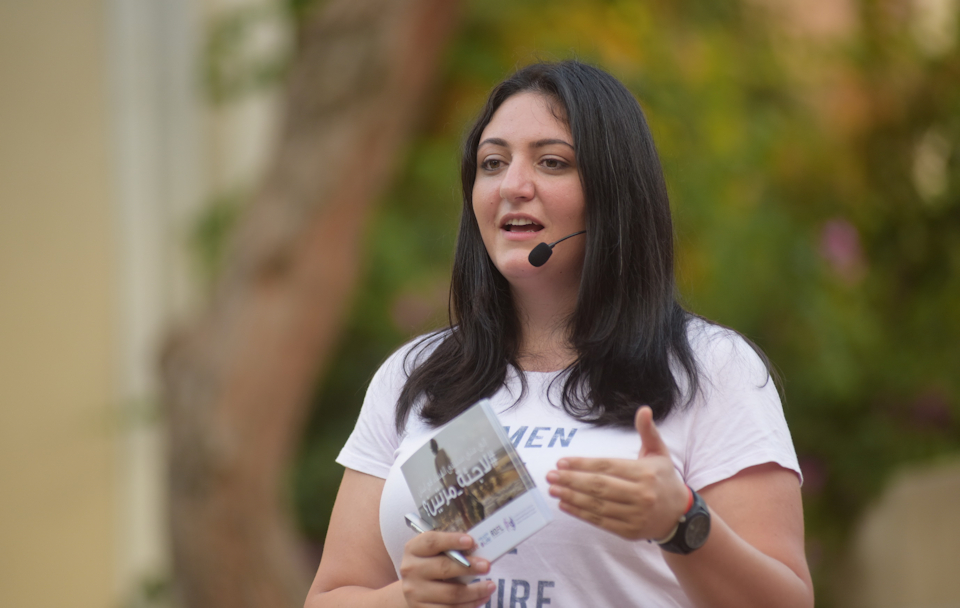
Hayat Mirshad is the co-founder of Fe-Male, a feminist grassroots collective that works with young women and girls to eliminate injustice and achieve gender equality by producing and disseminating feminist knowledge and amplifying the voices and presence of women and girls in the media space.
“At Fe-Male, our first response was to visit the affected areas, assess the needs and help in the cleaning and reconstruction efforts. We also launched a ‘Women of Beirut’ series which included stories of women and girls affected by the explosion to allow them to reflect on their experiences. We also advocated for enhancing protection measures as many girls were at higher risk of violence after the explosion, as they had to leave their houses and were feeling unsafe in poorly lit streets.
When relief operations started after the Beirut blast, they mainly focused on food distribution. No one was paying attention to the number of girls who reported not having access to menstrual products. As their families had experienced material losses of houses and properties, these girls didn’t have access to the safe, hygienic menstrual products they need. Mothers told us that their daughters had to replace sanitary pads with pieces of cloth.
The healing process is still a problematic issue. Now is the time to address the wellbeing and mental health of young girls. What happened was a real disaster, and it is not easy to overcome. Now is the time to scale up the response to ensure that all girls and women receive long-term assistance.
A year later, we are still lacking a sustainable response designed through a gender lens. We need a comprehensive plan to address gender-based violence during crises. Women’s rights grassroots organizations should be part of any decision-making process, as they prioritize women’s voices and causes.”
Josephine Zgheib
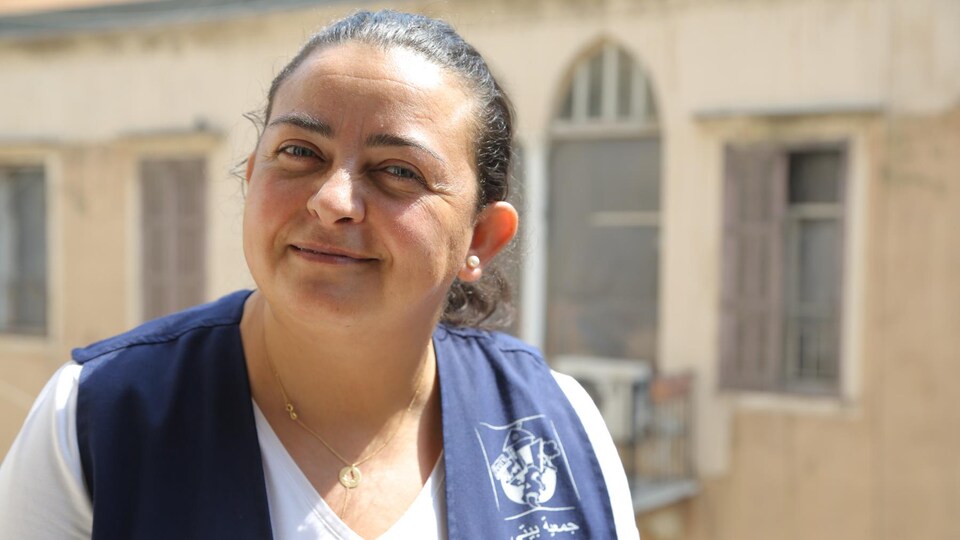
Josephine Zgheib is the President of Auberge Beity Association, a Beirut-based non-governmental organisation (NGO) focusing on sustainable social and economic development through capacity building and empowerment of local communities, especially of children, youth, and women.
“I was amazed by the number of women and girls who volunteered to help {following the blast}. They would come to the damaged areas to help clean shattered glass with their bare hands. Most of the organizations we worked with were led by women who could run roundtable discussions one moment and in the next drive vans or bobcat machines to remove heavy rubble.
We need a more inclusive response directed at women and girls. Sadly, a year since the Beirut blast, not much has been done at the national level. The dignity of women and girls should be restored.
We surveyed 600 people living in the stricken areas, 200 of them were women living alone, out of which 90 were elderly women (8% as per a UN Women Gender Analysis).
These elderly women lived isolated with no children and no social connections. They had lived through Lebanon’s conflicts, but all agreed they never experienced anything as horrifying as the Beirut Blast. As most of them had signed their rental agreements before they were liberalized in 1992 - allowing rental prices to be set by the market - they paid low rents and feared their landlords would reclaim their damaged houses.
An 80-year-old woman remained in her small house which was left with no windows. She relied on her nephews and nieces to provide her, once a month, with a meager income. Another woman was so terrified by the sound of the explosion that she remained confined inside her home. Two weeks later, when her neighbors came looking up for her, she realized that the explosion hit the Beirut Port and not her building.
We wanted to help others, despite the challenges. After the explosion, and for six months, we distributed 220 food boxes to those affected, including 90 boxes to aging women.
We noticed a great sense of solidarity among those affected. Daily, at noon, we would bring a hot meal to a 90-year-old retired nurse. In the afternoon, she would wear her white hat and go visit her neighbors to provide them with medical services.
Elderly women living in the affected areas seek food, medication, and services, but also someone to listen to them. With the help of the NGO Embrace, we set up a hotline to receive their calls.
Despite the brutality of the explosion, elderly women living in Gemmayze and Mar Mikhael neighborhoods, were finally visible. They felt less lonely, as the NGO members and volunteers visit them regularly and became their family.
A National Action Plan targeting elderly women affected by the blast is needed. The municipality should gather data on those living within the affected districts to be able to meet their needs, also the government should extend social security to all.
These women want to be treated with respect. A former bank employee who came to collect her food box always showed up wearing her fanciest clothes and her 30 years old earrings.
She had never requested aid before, and she just wanted to preserve her dignity.
Dayna Ash
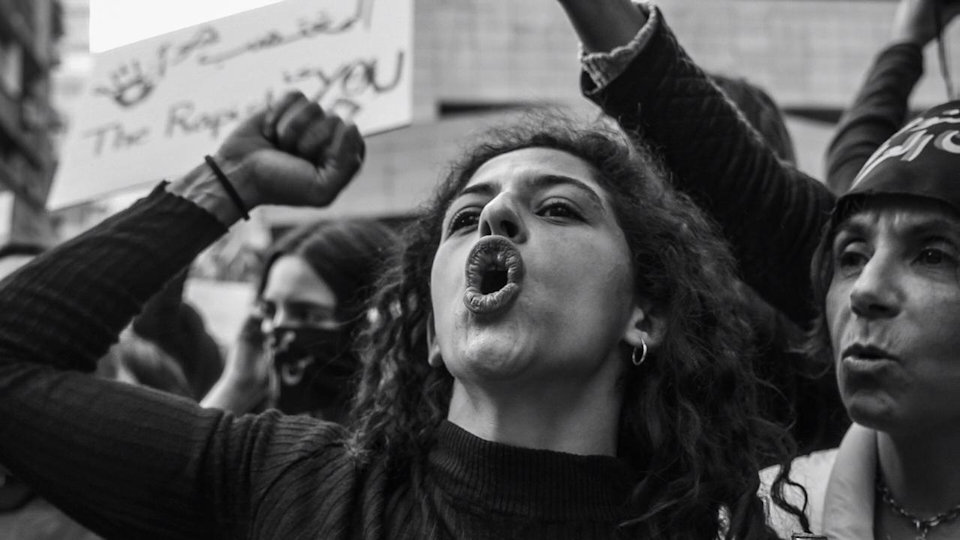
Dayna Ash is the Director of Haven for Artists, a feminist arts NGO that works at the intersection of art and activism, campaigning and advocating for women’s and queer rights through arts, culture, and creative spaces such as festivals and exhibitions, and events.
“For years, the areas of Mar Mikhael and Gemmayze have hosted the LGBTQI+ community. Our art institutes, NGOs, bars, cafes, and homes were there, and that was our safe space.
Members of the LGBTQI+ community felt displaced as their houses and businesses and places of employment were destroyed by the blast. Displacement is not always about leaving your home. Gemmayze and Mar Mikhael were the only places where we felt safe and got to know other people and felt protected. Taking away LGBTQI+ safe places, I think, affected this community a lot, since its members do not feel safe anywhere else in Lebanon.
Our community has already lost so much. The explosion was the final blow as they were already suffering from the financial crisis and the COVID-19 pandemic.
The blast did not just affect the physical space, it also affected the community’s sense of belonging. When we ask LGBTQI+ artists what they are mourning, they say that they are mourning an area that is not theirs. We are rebuilding something that most of us acknowledge does not belong to us, so when we rebuild it and we fight for it; we ask: will we have a space in it?.”
Hoda Kara
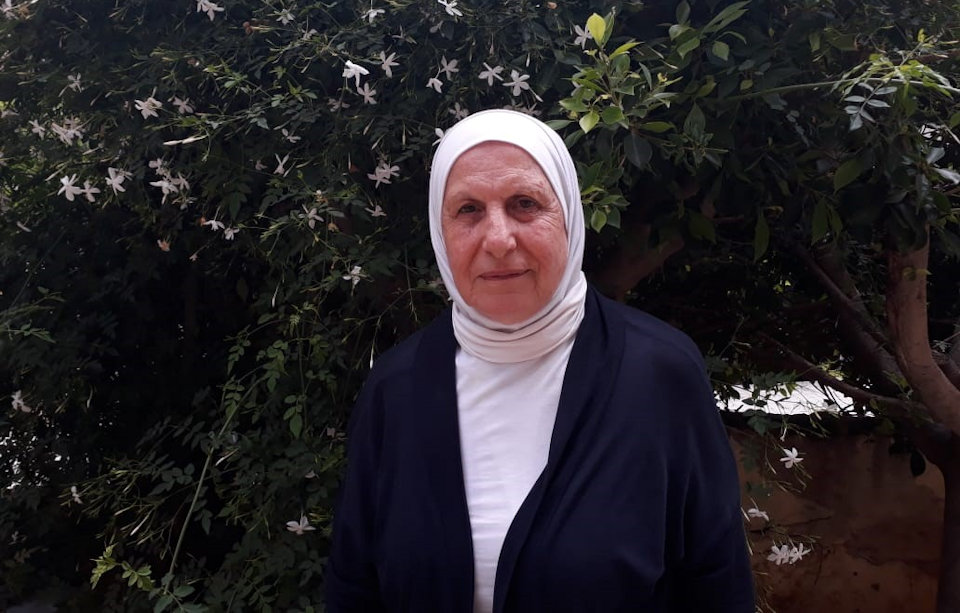
Hoda Kara is the Executive Director of Dar Al Amal, a Lebanese NGO that works since 1970 to safeguard women and children’s rights, particularly those who are vulnerable and at risk of various forms of violence, exploitation and abuse.
“I have lived through the Lebanese civil war, but I have never seen or experienced anything like the port blast. The team of Dar Al Amal was the first to respond to the needs of the people living in the affected areas, including sex workers. Dar Al Amal started to directly support their basic needs.
Sex workers usually live in poor areas, they live alone or with co-workers, and for these women, losing their houses meant losing their only safe place. If I lose my house, I can rely on my friends and family to shelter me. These women do not have a safety network and if available it is often unstable and temporary.
For a day or two following the explosion, few sex workers stayed in the houses of people they know, but they could not stay longer because their hosts started asking them for something in return, whether money or sex services.
There are women who had fled Syria and were forced into sex work to make a living in a foreign country. For many, the blast triggered the trauma that they had been trying to forget. Their mental health was further affected, and a year later, they are still suffering from distress.
Effective solutions cannot be developed only by the civil society. The country’s decision-makers should protect marginalized groups as they are most exposed and affected by the crisis and, hence, should be at the frontline of the response plans. If the government secured protection, health, and safety guarantees, organizations like ours could cover the shortage of services, but we cannot replace the state.”
Nada Anid and Victoria El Khoury Zwein
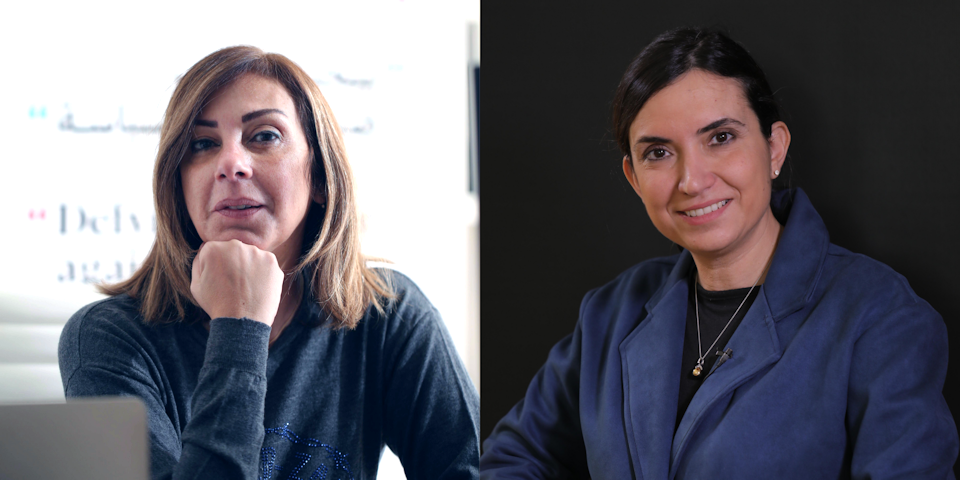
Nada Anid is the founder of Madanyat, a Lebanese NGO that works to create a fairer, more inclusive, and democratic society in Lebanon, where politics is more accessible to women and youth. Victoria El Khoury Zwein is the Director of ONDES, an NGO that operates in Lebanon and focuses on community development, women’s political participation, and youth engagement in local governance.
Victoria El Khoury Zwein: “Following the Beirut explosion and despite their active contribution in the response, women were absent on two levels: they were not asked about their needs and were not present at the official decision-making process.”
Nada Anid “Women must be engaged in recovery leadership and their role should not be restricted to humanitarian actions taking place on the ground. We need more transparent processes to reach decision making positions, and we need to hold elections that would take into account competency and not nepotism. Women are no longer absent from the streets, whether in relief actions or in civil committees; women have proven to have a vital role in the advancement of our society. But we have an issue with their political participation both on the local and national level. We need to work on providing them with better access to power mechanisms and on encouraging more women to participate in elections.
If there is anything we can reflect on based on what has recently happened, whether the COVID-19 pandemic, the economic crisis, or the explosion, we can say that women did not wait to take action to be part of the response, whether, through taking to the streets to protest or through direct aid. Following the Beirut blast, women were on the frontlines and were leading the response campaigns, but sadly they were absent from the official decision-making operations, channels and mechanisms.”
Layal Sakr
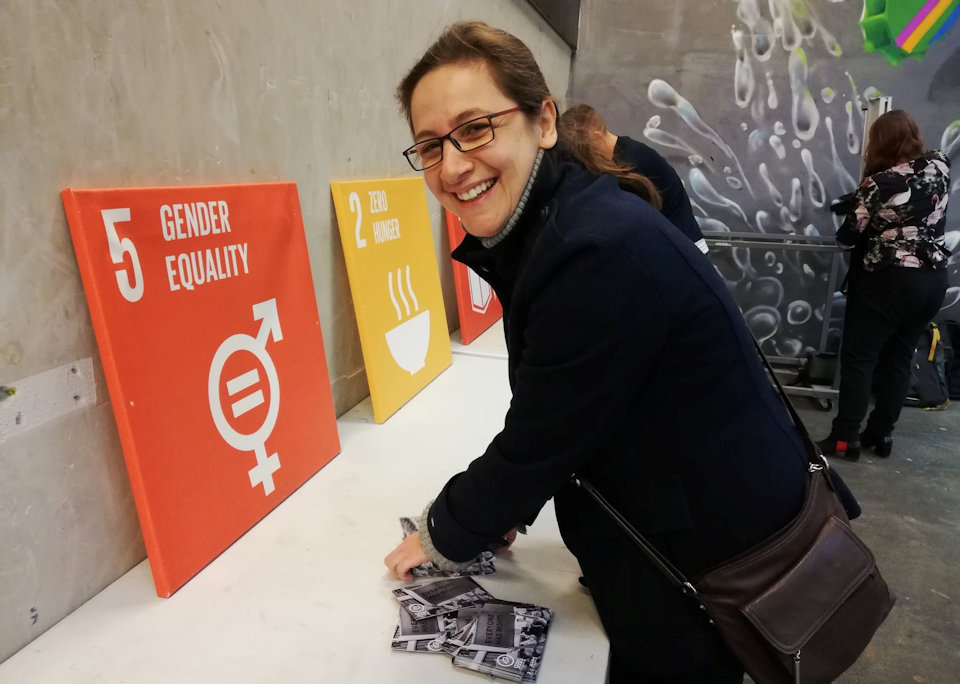
Layal Sakr is a lawyer and the executive director of Seeds for Legal Initiatives (SEEDS), a Lebanese NGO that works with marginalized groups to raise awareness on legal rights and advocate for legal reform.
“SEEDS is working on a study on the extent to which recovery programs that received funding following the Beirut blast succeeded in promoting the participation of women in decision-making processes. Using the Charter of Demands by Feminist Activists and Women’s Rights Organisations in Lebanon published on August 27, 2020, as a guideline for our research, we will be conducting a study assessing donors’ role in promoting a gender-inclusive response and whether they took into account the recommendations listed in the Charter.
We have already created a roadmap of international laws, committees, and resolutions that we will be walking through to study how recovery programs that received funding following the Beirut explosion succeeded in promoting the participation of women in decision-making processes.
This roadmap will be used to improve Lebanon’s legal framework and reinforce equality within the law. This will be done through networking with women-led groups and through building the capacities of stakeholders on gender inclusive policies in order to ensure a gendered recovery response. This is one of many steps necessary to reinforce equality within the law, both in the private sector and at the national level. We are still at the beginning of our research and data collection, but we have already noticed that the aid was not provided to women according to a gender lens design, but rather based on a general assessment of what people living in the affected areas needed.”